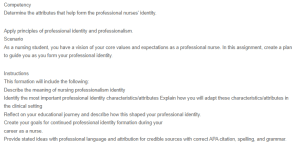Creating Your Professional Identity
Professional identity in nursing is described as identifying this profession’s essential values, principles, and norms. Philippa et al. (2021) noted that this identity involves traits like care, integrity, accountability, and out-of-school passion. These traits may pertain not only to rosy notions but are part and parcel of the tangible processes nurses undertake and are the pillars of trust and respect in the patient-nurse relationship. The crucial aspect of the discussed professional values is how they have been internalized to ensure quality care.
The process of building a professional self starts during the process of nursing education, the moment when entry-level students learn about the ethical and professional code that should be followed within clinical practice. It is not just a list of codes but a structure that guides a nurse’s behavioral or ethical engagements in guaranteeing the best patient outcomes, as depicted by Bimray et al. (2019). These codes are essential to understand and for a nursing student to integrate them as fundamental components of their attitude, behavior, and response to different scenarios.
As applied in clinical settings, these attributes are not a matter of knowing but acknowledging that it is imperative to work professionally. This involves demonstrating concern and support to patients and their families, comprehending their psychological and physical problems, and addressing them sensitively and appropriately. Moudatsou et al. (2020) highlighted the role of empathy as one of the critical elements of nursing since nurses can understand their patients as people and build rapport, which is vital for the working alliance that is essential in caring for the patient.
Furthermore, it is crucial to highlight that the process of personal and professional growth is a lifelong endeavour in nursing. Professional socialization is critical to determining a nurse’s professional image; education enhances knowledge, skills, and experience to understand the significance of embracing the mentioned values (Flaubert et al., 2021). As a student and a professional, I have always strived to use my best efforts and look for more ways to grow. I will continue my professional development by employing formal training, including acquiring new credentials, as well as informal learning, including reflective practice.
Of these approaches, the professional practice approach has significantly impacted forming my professional identity, primarily through reflective practice. Looking at the positives and weaknesses has helped me understand myself in detail as a learner and team member. This self-reflection process has allowed me to maintain the consistency between my behaviour and professional values throughout the clinical practice.
In my future career, I will strive to adhere to these values, incorporate them into my practice, and enrich the nursing culture. I want to participate in research projects that can inform best practices and contribute to practice development in nursing to progress the profession. Also, I must teach and train other nurses with my experience and knowledge to build their professional persona.
In conclusion, forming a professional identity in nursing is a lifelong and continual process influenced by many factors, such as individual practice, education, and critical self-reflection. I work to create and maintain my professional image by implementing these activities with a focus on professional values, commitment to learning, and focus on the patients as valued customers. In this way, I keep updating myself and concentrate on the future of the nursing profession.
References
Bimray, P., Jooste, K., & Julie, H. (2019). Professionalism experiences of undergraduate learner nurses during their 4-year training programme at a Higher Education Institution in the Western Cape, South Africa. Curationis, 42(1). https://doi.org/10.4102/curationis.v42i1.2030
Flaubert, J. L., Menestrel, S. L., Williams, D. R., & Wakefield, M. K. (2021). Educating Nurses for the Future. In www.ncbi.nlm.nih.gov. National Academies Press (US). https://www.ncbi.nlm.nih.gov/books/NBK573912/
Moudatsou, M., Stavropoulou, A., Philalithis, A., & Koukouli, S. (2020). The Role of Empathy in Health and Social Care Professionals. Healthcare, 8(1), 1–9. https://www.ncbi.nlm.nih.gov/pmc/articles/PMC7151200/
Philippa, R., Ann, H., Jacqueline, M., & Nicola, A. (2021). Professional identity in nursing: A mixed method research study. Nurse Education in Practice, 52(1), 103039. https://doi.org/10.1016/j.nepr.2021.103039
ORDER A PLAGIARISM-FREE PAPER HERE
We’ll write everything from scratch
Question 

Creating Your Professional Identity
Competency
Determine the attributes that help form the professional nurses’ identity.
Apply principles of professional identity and professionalism.
Scenario
As a nursing student, you have a vision of your core values and expectations as a professional nurse. In this assignment, create a plan to guide you as you form your professional identity.
Instructions
This formation will include the following:
Describe the meaning of nursing professionalism identity
Identify the most important professional identity characteristics/attributes Explain how you will adapt these characteristics/attributes in the clinical setting
Reflect on your educational journey and describe how this shaped your professional identity.
Create your goals for continued professional identity formation during your
career as a nurse.
Provide stated ideas with professional language and attribution for credible sources with correct APA citation, spelling, and grammar.